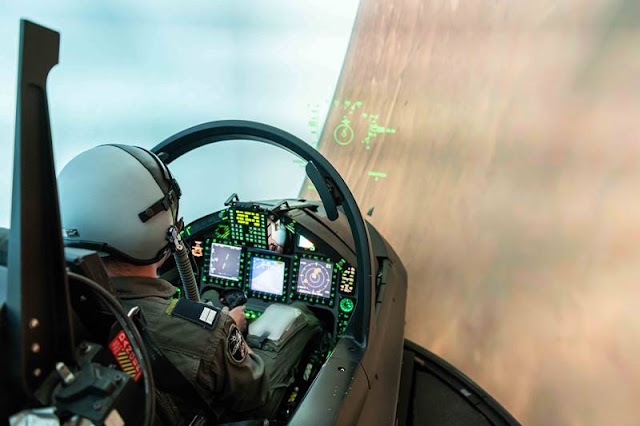Young Israeli fighter pilots fly M-346 in simulated combat missions from Six-Day War
 |
| Istaeli Air Force M-346 Lavi takes off to participate in a simulated combat mission. |
At the beginning of March, the recent flight course graduates in their Operational Training Course (OTC) at the Israeli Air Force 102nd "Flying Tiger" Squadron, participated in an exercise that simulated the combat scenarios of the Six-Day War. For young Israeli fighter pilots, it was not just another training flight, but an operation that replicated one of the most successful and significant wars in Israeli history.
The exercise commenced with a day on the ground, during which the aircrews learned the history and connected it to the flights they would later simulate. "The first day gives us a background about Israel's wars, specifically the Six-Day War. We touch upon the general story, its causes, and the influence it had on history", explained Lt. Y from the OTC. During the day, they toured Jerusalem and Ammunition Hill and met with Brig. Gen. (Res.) Shlomo Egozi, who fought as an aircrew member himself. Lt. Y. shared what he felt throughout the meaningful day: "We concentrated on 'Operation Focus' and the battle story we heard was especially interesting. In the coming years, we will be operational in the IAF's various squadrons, and he shared with us how it feels during a war, it made the story more personal".
On a subsequent night, the commanders gave the aircrew members an order and they began to plan the operation. "We received the command and planned every aspect - fuel prep, adapting doctrine to the task, and mapping out possible scenarios. We created a briefing and prepared to destroy a base in the morning". The comprehensive preparation is significant, as it is the first full "operation" of the OTC - up until this point, the trainees only drilled specific tasks and maneuvers.
Over an entire day, the trainees flew in the simulator, while the instructors continued to add obstacles and challenges. All this was done using similar means to those used over five decades ago. Maj. G. added: "In this day and age, air controllers provide a wide picture and can speak freely over the controls. That wasn't always the case, however. In the past, pilots would often have to identify targets alone and make decisions in radio silence to prevent leaking information".
After each sortie, the aircrews debrief and discuss their recent flight performance facing unplanned scenarios. At the end of each day, all cadets debrief together and each of them shares individual conclusions. "We studied the operational orders for many hours prior to the training day. However, I was personally met with new challenges during the sorties", concluded Lt. Y. "This exercise is essential since it strengthens our mental preparedness and connects us to the operational realm".
Source, Images: Israeli Air Force
Photo Credit: Amit Agronov







No comments
All comments related to the contents of our articles are welcome. It is not allowed to post promotional messages, links to external sites, or references to activities not related to this blog.